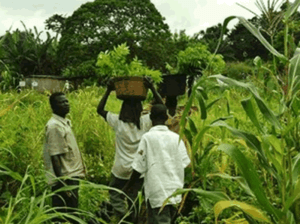Government should ensure right markets for small-holder farmers – Study
 The Government has been urged to ensure that Ghanaian farmers get their farm produce to the right market to enable them to earn acceptable rates on their investment.
The Government has been urged to ensure that Ghanaian farmers get their farm produce to the right market to enable them to earn acceptable rates on their investment.
Government was also asked to rehabilitate or construct bad roads that inhibit the transportation of food from the farms to the market centres, aside all other good interventions like the Planting for food and jobs that was boosting the agriculture sector.
The call was part of a recommendation of a study undertaken by the University of Ghana, on the “Ghanaian Food Systems” aimed towards finding out the contributions of the Ghanaian small-holder farmer towards food security in the country.
The findings indicated that the small-holder farmer in Ghana contributes about 80 per cent of all food produce in the country in spite of their challenges, that included poor access to market, bad prices, poor road network to transport farm produce as well as the use of primitive strategy in farming.
It also revealed that many of the small-holder farmers had generally low level educational background.
The findings of the study was presented together by Professor Joseph Kofi Teye and Professor Joseph Awetori Yaro, Senior lecturers at the University of Ghana, at a stakeholders’ workshop in Accra, dubbed: “Improving Food and Nutrition Security in Ghana from a Food Systems Approach”.
The study became the main issue of discussions at the workshop that was organised by the Ministry of Foreign Affairs of the Netherlands, in collaboration with the Netherlands Organisation for Scientific Research, and the Food & Business Knowledge Platform (F&BKP), one of the five Knowledge Platforms for global development set up by the Dutch Ministry of foreign Affairs in 2013.
Speaking to the Ghana News Agency on the sidelines of the Workshop, Prof Teye explained that the study, commissioned by the Open Society Initiative for West Africa (OSIWA) and Peasant Farmers Association of Ghana, was carried out last year in the whole country under the Coastal, the Forest belt and the Savanna Zones.
He emphasized the need for government to critically look at the market segment of food production, which he said, was very important in the value chain, adding that, the local buyers and middlemen or agents still fix prices of the produce to the disadvantage of the farmers.
Prof Teye said government should also expand and duplicate mechanisation of agriculture to help increase farm worker productivity, especially in the Northern zone, which mostly depend on mechanisation for their farming activities.
Prof Yaro on his part, noted that, the crop system in Ghana was encouraging as the agriculture sector had been revamped over the years, and farmers continuing to produce mostly maize, groundnut, soya beans and oil palm, among others.
He however said there was the need for more efficient food systems and called for a pro-small-holder policy that aims at bringing the government players and the private sector together to attain food sufficiency and quality nutritional food for the people.
Prof Yaro said agriculture production had a very bright future because of the huge population that is involved, adding that, food distribution continues to evolve around different actors, especially the middlemen and agents, who buys the food and supply to the consumers.
Professor Lauren Klerkx of the Wageningen University, the Netherlands, said it was important for every nation to pay attention to the food systems, which included growing, processing, distribution, costing and disposing of foods through the provisions of inputs and into waste recycling.
He said the University was therefore collaborating with Ghana and other agencies to help improve the sector, which also involves the fishing sector.
Mrs Faustina Vimariba, Greater Accra Regional Nutritional Health Officer, Ghana Health Service, said the Service was collaborating with the Ghana Education Service to update the curricular on learning and teaching of nutrition in schools to help students understand and adopt healthy eating to improve the nutritional status of the people, especially children, many of who were malnourished because of their bad eating habits.
Ms Vanessa Nigten, of the F&BKP said the workshop was to enable participants from the research institutions, academia, civil society, scientists’ among others, to discuss how to help improve food security in Ghana.
The workshop was also to deliberate on how Ghanaian consumers could access sufficient various quality food that was in accordance with their dietary wishes and health needs, and the drivers of change that were needed to achieve them sustainably.
The participants discussed possible directions for solutions by exchanging ideas on various issues including local, regional, global trade, innovation, marketing, land rights, population, transport, values, and informal markets wages.
Other issues discussed were agriculture, foreign direct investments, seasonality, consumer demands, food safety, and the ecological food print.
Source: GNA
